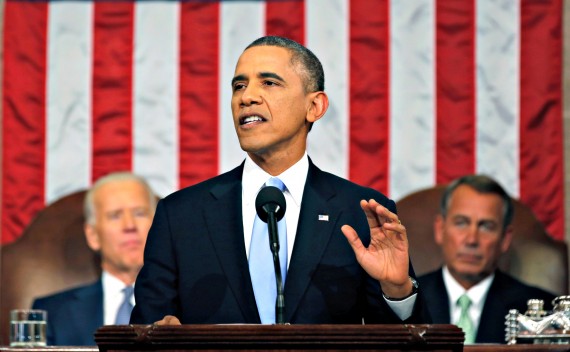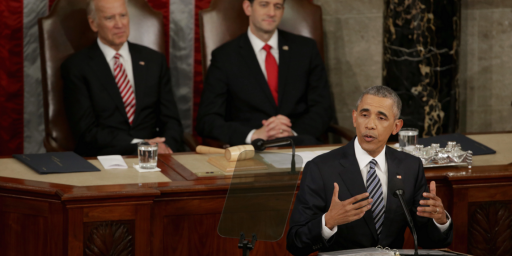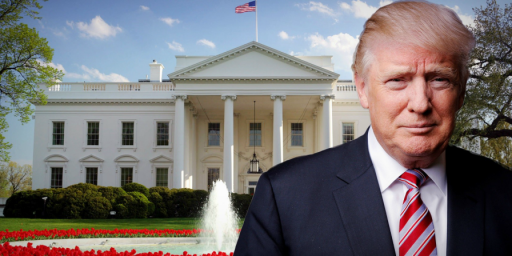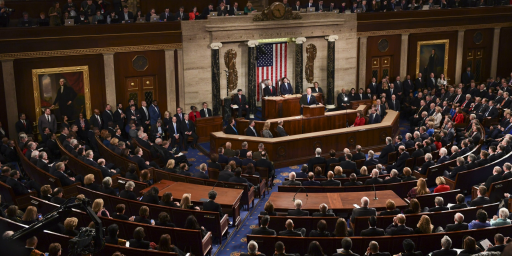President Obama Delivers Low-Key, Low-Ambition State Of The Union
The President's sixth State Of The Union Address was fairly low-key.
Going into last night’s State of the Union Address, early reports indicated that President Obama was going to set a defiant and confrontational tone with a Congress that seems unlikely to do much more to advance his agenda than it did after last year’s Address by using his authority to sign Executive Orders to make end runs around Congress where he could, and utilizing the bully pulpit where Executive Orders could not reach. In some sense, he did do that with announcements such as the fact that he would be signing an Executive Order that would raise the minimum wage that Federal Contractors are required to pay their employees when working on Federal Government contracts, although it’s worth noting that this order does not impact any ongoing contracts, only applies to future contracts that the government signed, and may well be subject to efforts to block its effectiveness by Congress acting through the appropriations process. There were threats and promises of other actions on the President’s part, but, as Ron Fournier notes, in the end the President presented a rather modest agenda, likely in recognition of the fact that he is fast approaching lame duck status:
Is that all there is?
In what may be his last, best chance to revive a presidency that has fallen far short of its promise, Barack Obama unveiled his 2014 agenda Tuesday night: small-bore executive orders, studies, summits, and legislation, long-seasoned and stalled. “America does not stand still,” he said, “and neither will I.”
He focused on the era’s seminal issue, loss of social mobility and income equality in a post-industrial, global economy. “The cold, hard fact is that even in the midst of recovery, too many Americans are working more than ever just to get by—let alone get ahead,” Obama said to a joint session of Congress attending his annual State of the Union address.
Another cold, hard fact: Obama may not have the skill, the will, or the time to do much about it.It was a good speech about a modest agenda delivered by a diminished leader, a man who famously promised to reject the politics of “small things” and aim big—to change the culture of Washington, to restore the public’s faith in government, and to tackle enduring national problems with bold solutions. The night he sealed the Democratic nomination in 2008, candidate Obama looked forward to a day when future generations might say “this was the moment when the rise of the oceans began to slow and our planet began to heal.”
Tuesday night was no such moment.
It was, instead, a moment in miniature: an executive order to raise the minimum wage for future federal contractors, and another to create “starter” retirement accounts; summits on long-term unemployment and working families; and scores of promises to “continue” existing administration programs.
“What I offer tonight,” he said, “is a set of concrete, practical proposals.” Oh, such a far cry from “an audacity to hope.”
Josh Marshall came away with a similar impression, although he is more upbeat about
There was a lot of talk in advance about the President throwing down the gauntlet and doing a lot through executive action. And then more recently that the essence of the speech would focus on rising economic equality. Both were there. But I took a somewhat different message from listening to him deliver it.
I’d sum it up in two words: “Whatever, guys …”
Gone from the speech was what I’d heard in pretty much every other Obama State of the Union, pressing bipartisan cooperation, finding common ground, pushing points of agreement. There wasn’t a contrary note. It was more just ignoring the whole thing, as though the President were saying, “Okay, guys, I get it. You won’t do anything. Okay. Fine.”
Basically, let’s not play that charade anymore.
Partly, he has Obamacare, which he sees as his principal legislative accomplishment. It’s still not popular. But neither is repealing it. And the numbers are starting to move in its favor. But as much as anything he said to the Republican opposition, “Fine. You’re against it. It may hurt us. But it’s not going anywhere. So it’s just done. Whether you want to realize it or not.”
He also pointed to a handful of things he’ll do through executive action.
But as much as anything he seems comfortable (perhaps in some way liberated) with the fact that the legislative phase of his presidency is most likely over and seemed to be announcing what we call its rhetorical phase, using the bully pulpit to point a path for the country to move forward, using executive authority to nudge it forward where he can but mainly leaving a Congress that refuses to function to its own devices.
Ramesh Ponnuru also sees the Clintonian similarities:
It seemed like a laundry list of mostly dinky initiatives, and as such a return to Clinton’s style of State of the Union addresses. Those speeches got some bad reviews as oratory but were pretty popular and I suspect this one will go over well too. The speech gives the president the opportunity to present himself as a reasonable guy working hard for the American public, and he did an effective job of that. A few of the ideas in the speech may even be good ones: the “myRA” proposal, for example, seems like it’s worth considering. But nobody is going to remember this speech two days from now — with the exception of Obama’s very moving closing remarks about Sergeant First Class Cory Remsburg.
Earlier today there was some speculation that Obama would return to the theme of being a “transformative” president who liberated us from the legacy of Ronald Reagan. But the speech was much more cautious than that. The recent campaign against inequality was mostly forgotten (too late for some of the Republican respondents to adjust), cast aside for the theme of expanding opportunity, which has deeper roots in American opinion. Probably the best example of the president’s caution came in the section on gun control, which seemed to be there mostly so that nobody could say that it was not — and which mentioned no specific steps Obama was taking to “stand up for the lives that gun violence steals from us.” Obama is no longer even trying for a gun control as significant as the one Clinton got. So maybe saying it’s a Clintonian speech is giving it too much credit.
In the end, it’s not entirely surprising that the President’s sixth State of the Union would be fairly low-key. As we enter the final years of his Presidency and, more importantly, another midterm election year, the likelihood of significant legislative action is pretty slim. Indeed, beyond the budget for Fiscal Year 2015 and dealing yet again with the debt ceiling in a matter of only a few weeks, it seems unlikely that we’ll see anything major out of Congress this year. Any further action in the area of gun control is dead at least for this year, and likely for the rest of Obama’s term. Comprehensive immigration reform still seems like something of a pipe dream not withstanding signs from the GOP that the leadership would still like to find a way to push it through. Initiatives like increasing the federal minimum wage are quite simply not going to make it through the current House Of Representatives. Most importantly, once the spring and summer roll around Congressmen and Senators in both parties are going to start paying attention to primary elections and the ensuing General Election. At that point, the odds of significant legislation passing Congress will decrease significantly, although it is worth noting the 1986 immigration bill passed right before the last round of midterm elections of the Reagan years, and was signed into law by the President just two days after the election itself.
With the possible exception of immigration, though, it’s hard to see any significant legislation passing Congress this year. House and Senate Republicans are unlikely to want to cede ground now on issues that they’ve put up a fight for at least the last four years with primary election fights looming, and Democrats are unlikely to want to make significant compromises on issues that they see as potential campaign issues prior to the General Election. In other words, we’re looking at what has become typical Congressional behavior during a midterm election, especially during the sixth year of a two-term Presidency. With midterms around the corner and a Presidential election getting ready to gear up as soon as those are over with, Congress as a whole is going to start paying less and less attention to the President and his agenda and President Obama will begin the quick trip into lame duck territory that every President since the adoption of the 22nd Amendment has experienced. That’s why we hear him talking about Executive Orders that, in reality, only accomplish a limited number of things and attempting to branch out into establishing some kind of foreign policy legacy (see e.g., the Iranian nuclear talks and the quixotic quest for an Israel-Palestinian peace deal.) Indeed, when the 2015 State of the Union rolls around, it’s likely that President Obama will be even less ambitious in the agenda that he presents to the nation, unless the 2014 elections bring about the rather unlikely event of Democrats taking back control of the House of Representatives.
If nothing else, then, last night’s speech was really the beginning of President Obama’s status as a lame duck President. He’ll resist the implications of that designation for some time, no doubt, but it will come nonetheless and last night we saw the beginning of his transformation.







I recall tuning out the moment he began with the theatrical “teacher, entrepreneur, autoworker, farmer” preening. You do not start a speech that way. It immediately primes people into thinking you don’t take crap seriously.
It wasn’t a good speech. It had some neat moments, such as when he came down hard on climate science deniers, but that sort of forceful language would’ve been risky on any other topic that wasn’t a decade old. So the rest of it was adorned in optimistic pap which guaranteed the speech’s passing from memory.
A Clintonesque SOTU was appropriate in his times, when business-as-usual could pass muster. It doesn’t work when real solutions are need.
Let’s not even get started on how passive-aggressive he was concerning Congress’s inability to legislate. As much as I would’ve liked to hear a firebrand denunciation of a do-nothing Congress on national television (and the complete lack of applause), I realize a president needs to be civil. But the way he went about it struck me as too much passive, not enough aggressive.
A safe bet given Congresses record.
http://www.bostonglobe.com/news/politics/2013/12/04/congress-course-make-history-least-productive/kGAVEBskUeqCB0htOUG9GI/story.html
But hardly a reflection on this President.
The Arizona GOP just censured its own Senator, a former GOP presidential candidate.
And Obama should have proposed sweeping legislation?
I think it’s very hard for rational people, especially people who see themselves as moderate and non-partisan, to accept the fact that the GOP will never, ever, under any circumstances, ever, agree to anything that Mr. Obama proposes. Ever.
Stop blaming the sane guy for being unable to persuade the crazy people. There is no “both sides” thing here. It’s one side. Just one side. And until the voters say different, that’s the way it is.
@Tillman: If you want to guarantee that no one will take anything you say seriously, saying the president is “preening” is a darn good way to go about it.
Whether or not it was your intent, this is the code word that the pseudo-intellectual right has chosen to use in place of “uppity.”
You only redeem yourself a little by using it in such an incoherent way. How describing normal people adressing their days can be seen as “preening” is beyond reason.
If the Dude knew you were using his portrait as your avatar, he’d never stop throwing up.
You’re swinging at shadows @wr. Tillman’s commenting history demonstrates that he is by no means a member of the “pseudo-intellectual right”, or most likely even the right for that matter.
Seriously, calling out “X” word as RACIST! Code (despite its context or who is using it) is exactly the sort of knee-jerk comment that folks like Jenos or Bithead use to justify the claim that the left thinks any criticism of Obama is always based in racism.
Let’s not become a parody of ourselves.
@michael reynolds:
x 10
In a sense, it started once the GOP took control of the House in the 2010 mid-terms. Nothing has fundamentally changed since then.
It is unlikely to change in the 2014 mid-terms (I expect the Dems to hold the Senate, albeit barely, and fail to re-take the House).
In the Presidents defense…the SOTU is the least of things we as a nation need to be concerned about…
http://www.rightwingwatch.org/content/fischer-beyonc-s-sasha-fierce-persona-demonic-spirit
I’m confused. I didn’t tune in (from Canada, eh) but I read a few commentaries that suggested Obama declared himself King, stripped Congress of its power and tore up the Constitution.
;]
@pylon:
The expectation ahead of the speech was all about that. Then the actual speech occurred and it was not at all like that. But commentators roughed in their ideas beforehand, so just plugged confirming pull-quotes into their pre-determined narrative.
Thus always.
I too felt like Tillman, that Obama should have been more aggressive and well, dammit, HONEST. He could have said the reason the economic recovery was slow was because the Republicans deliberately blocked any attempt to speed the recovery. Jonathon Chait nails it:
He went on to say:
The question I have is, Why would he be an idiot to say that? Isn’t it just the unvarnished truth? David Corn says he wouldn’t be an idiot at all:
I don’t know whether Obama was limited by some outworn notion of civility, or whether he hopes against hope that the Republicans might yet relent in their obstructionism. But frankly, I’m sick and tired of the pretense that the Republicans are somehow a good faith partner in government. Obama should have called it as it is, and let the chips fall where they may. Maybe he’s holding fire till another occasion. But it’s past time for truth.
The good thing with this limited agenda is that it’s all within Obama’s power. Obama doesn’t have to beg the Republicans to kumbah yah and cooperate: he can just issue executive orders. The minimum wage orders will eventually be a big deal: there are a lot of federal contractor employees. Once all those employees get the minimum wage, it’s going to be hard to reverse that, and it will be the foundation of a broader movement for a higher minimum wage. If he concludes a deal with the Iranians, that will be an important foreign policy success too.
And of course he can fully implement the ACA. Every person in a red state who signs up for extended Medicaid or on the exchange is a potential future Democratic voter and every red state governor who resists Medicaid expansion will be on the defensive. Rumors of Obama’s lame duck status are greatly exaggerated.
Obama’s low-key SOTU speech? Low-key is synonymous with “flat” and “tepid”. Boring and pointless are other terms that come to mind.
I suppose people like Fournier expect the President to simply declare a royal fiat to get things done…what would be the point of talking about soaring goals and plans when he has a Congress that will say “F@ck No!” as soon as just about anything he wants arrives on their doorstep?
Despite the fact that this is the truth, if he had done that, we would have seen all the right-wing loons as well as much of the media shedding crocodile tears and screaming about how horribly harsh he is and how he is such a terrible disappoint to the spirit of bipartisanship…
Perhaps he should of done some juggling of knives while he was talking…or maybe he could have made paper airplanes and aimed them at Supreme Court Justices he doesn’t agree with…
@wr:
I originally wanted to go with “flourish,” but decided using it and “theatrical” in the same sentence was cliche.
In the context of a State of the Union address promoting the achievements of his administration for the last five years? That can be fairly described as “preening.” It might not be the most appropriate word, I’ll admit that, but you seem less concerned with my [lack of] vocabulary and more with my pseudo-intellectual rightward critique.
To which I reply, I am not edmondo.
@stonetools: People have said from pretty much the ’08 primaries that a weakness of Obama’s is he can come off as “professorial.” (I never thought that was a weakness, but I don’t run campaigns.) The kind of speech that would honestly review the record of bad acting and brinksmanship in our government would end up sounding like a lecture.
A lecture people need to hear, no doubt. But a lecture they’d tune out because no one likes being lectured to.
@pylon:
I was hoping that Obama would say something like, “Effective midnight tonight, I will be issuing an Executive Order, directing our military to begin the confiscation of privately owned guns in our country” {{{pause}}} “Just kidding.”
Can you imagine? Ted Cruz and Darrell Issa would have exploded right there. Michele Bachman and Steve King would have readjusted their Tin Foil to see if they received that signal correctly.
@Tillman:
Do you remember Bill Clinton’s long and detailed takedown of the Republicans at the 2012 Democratic convention? A lot of people thought that was the best speech in a convention of good speeches. I think that many people sell the public short saying that they don’t want to listen to a policy-heavy speech. It think that’s wrong.
I also think that there is also a place for attacking rhetoric. Examples include Harry Truman who really did give ’em hell. He would say things like “We’re gonna beat the Republicans and we’re gonna make ’em like it”, say that any farmer who voted for a Republican needed their head examined, and talk about Republicans “driving a pitchfork into the back of labor.” The MSM of the time tut-tutted, but the public certainly liked it. Then there Roosevelt’s “malefactors of great wealth” speech and Bryant’s “cross of gold”.
I also think that while us politicos understand the full extent of Republican obstructionism, the public really doesn’t. What they tend to read are headlines like “Congress fails to pass Unemployment Insurance” rather than “Republicans Filibuster UI Bill.” The MSM is pretty much dedicated to a “both sides do it” meme which hides the fact that it’s really one side doing it. Its past time for the President to get up there and say just that, and give examples.
@An Interested Party:
How is that different from what’s happening now? We have the National Journal blaming the President’s failure to lead as the reason for the failure of his legislative efforts, although they admit the Republicans have been obstructionist. The Republicans from day one have been claiming that the President refuses to compromise. My feeling is that he may as well tell the truth. I don’t see him losing anything at all, and he doesn’t have to worry about re-election.
aim low, shoot low- the lame duck prez has arrived.
Thank you for that spine-tingling revelation…that fate he shares with most of his predecessors…
Something profound most people – including me – missed last night was the way Obama called out the senators from AIPAC. They’ve been backing down ever since. Obama just spanked AIPAC. How often have you seen that in your life? Never?
@Tillman: I know you’re not Edmondo, and I know you’re not of the pseudo-intellectual right (by which I mean the NR crowd, who fancy themselves deep thinkers). I found your use of this word offensive, but I phrased my message poorly. For that I apologize.
But to Matt B — Yes, when a word takes on a secondary meaning, then those who adopt it also adopt that meaning. If you, for instance — and I use you as an example because you have never showed any kind of racial animus in any of your postings — called Obama a “boy,” you would still be carrying all the freight that word has in the context of describing black men.
@wr:
Don’t sweat it. You did get “pseudo-intellectual” right.